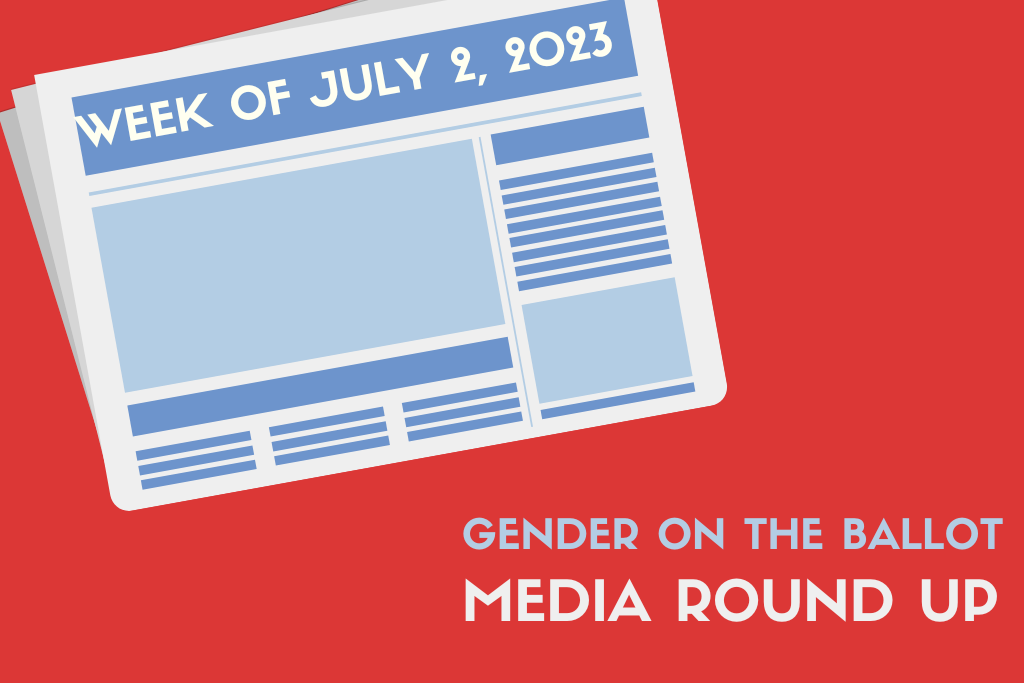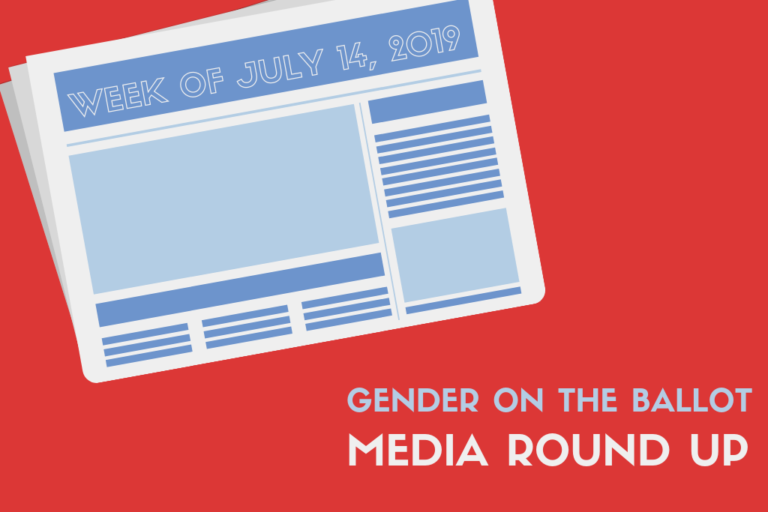Happy Friday! Welcome to our Media Round Up. Each week we’ll be collecting and…
Media Round-Up: Week of July 2nd

Happy Friday! Welcome to our Media Round Up. Each week, we’re collecting and sharing gender + politics stories. Here’s what caught our eye this week:
Democrats eyeing suburban women to launch new gun control effort
Alexander Bolton, The Hill
One year ago, lawmakers passed gun control measures in response to a number of mass shootings last year. This year, Senate Majority Leader Chuck Schumer (D-N.Y.) said that the Senate will make another attempt at passing gun control legislation in response to a new wave of mass shootings. Over the holiday weekend, at lease 10 people were killed in shootings in Baltimore, Fort Worth, and Philadelphia. Since July 1, the Gun Violence Archive has counted 20 mass shootings across the country. Polls show that suburban voters, a critical voting bloc according to Senate Republican Leader Mitch McConnell (R-My.), support stricter gun laws. A poll conducted in May by All In Together, a nonprofit women’s civic education group, in collaboration with others found that gun control is the number one concern of women voters going into the 2024 election.
Read the full story here.
Women are returning to the job market in droves, just when the U.S. needs them most
Scott Horsley, NPR
The share of working-age women between 25 and 54 who are in the workforce or looking for work hit an all-time high of 77.6%. Of the African American women in that same age range, more than 80% of them are in the workforce. This increase in women in the workforce is in stark contrast to the early days of the pandemic when millions of women lost their jobs due to businesses closing and many dropping out of the job market to look after children and ailing family members. While some worried that the ranks of working women would take a hit for years to come, women’s participation in the workforce has rebounded from the pandemic more than men’s has. Betsey Stevenson, an economist at the University of Michigan, sees this as evidence that women are increasingly determined to play a major role in the economy.
Read the full story here.
Local women in politics face more threats over social media than men
Amita Sharma, KPBS
In a study conducted by academics based out of San Diego, researchers found that women are three times more likely than men to be threatened via social media. Rachel Locke, director of the Violence, Inequality and Power Lab at the University of San Diego found that on average, women received threats that were more personalized and sexualized, and involved family members. The findings from the study by the University of San Diego track with a recent national poll by Princeton University of local elected officials from different areas of the country. The next phase of the study will be to brainstorm solutions to reducing threats.
Read the full story here.
Chi Omega sisters call for change after nonbinary member was kicked out
Jennifer Gerson, The 19th*
Fabian “Fa” Guzman accepted a bid from Chi Omega in the fall of 2022 after St. Lawrence University received permission from the national organization allowing Guzman to rush as a nonbinary student. Guzman became the first nonbinary person to rush at the small liberal arts college located in upstate New York. Ten months later, Guzman was told their membership was being voided because they do not exclusively identify as a woman and because of their sex assigned at birth. Chi Omega’s membership policy states that ““membership selection criteria shall include females and individuals identifying as women of diverse racial, religious, and ethnic backgrounds.” Guzman has started a petition asking for Chi Omega’s national office to reinstate their membership, gaining over 600 signatures in three days.
Read the full story here.
A Blood Test Predicts Pre-eclampsia in Pregnant Women
Roni Caryn Rabin, New York Times
A blood test that can identify pregnant women are at imminent risk of pre-eclampsia has been approved by the Food and Drug Administration. Pre-eclampsia is a severe form of high blood pressure and a leading cause of disability and death among childbearing women. The new test could possibly offer an early warning for pregnant women who will go from having suggestive symptoms to developing the life-threatening disease. The test is just the first step – the extent to which it will improve outcomes and save lives is not clear, and there is currently no effective treatment for pre-eclampsia.
Read the full story here.







